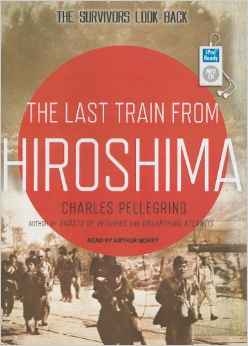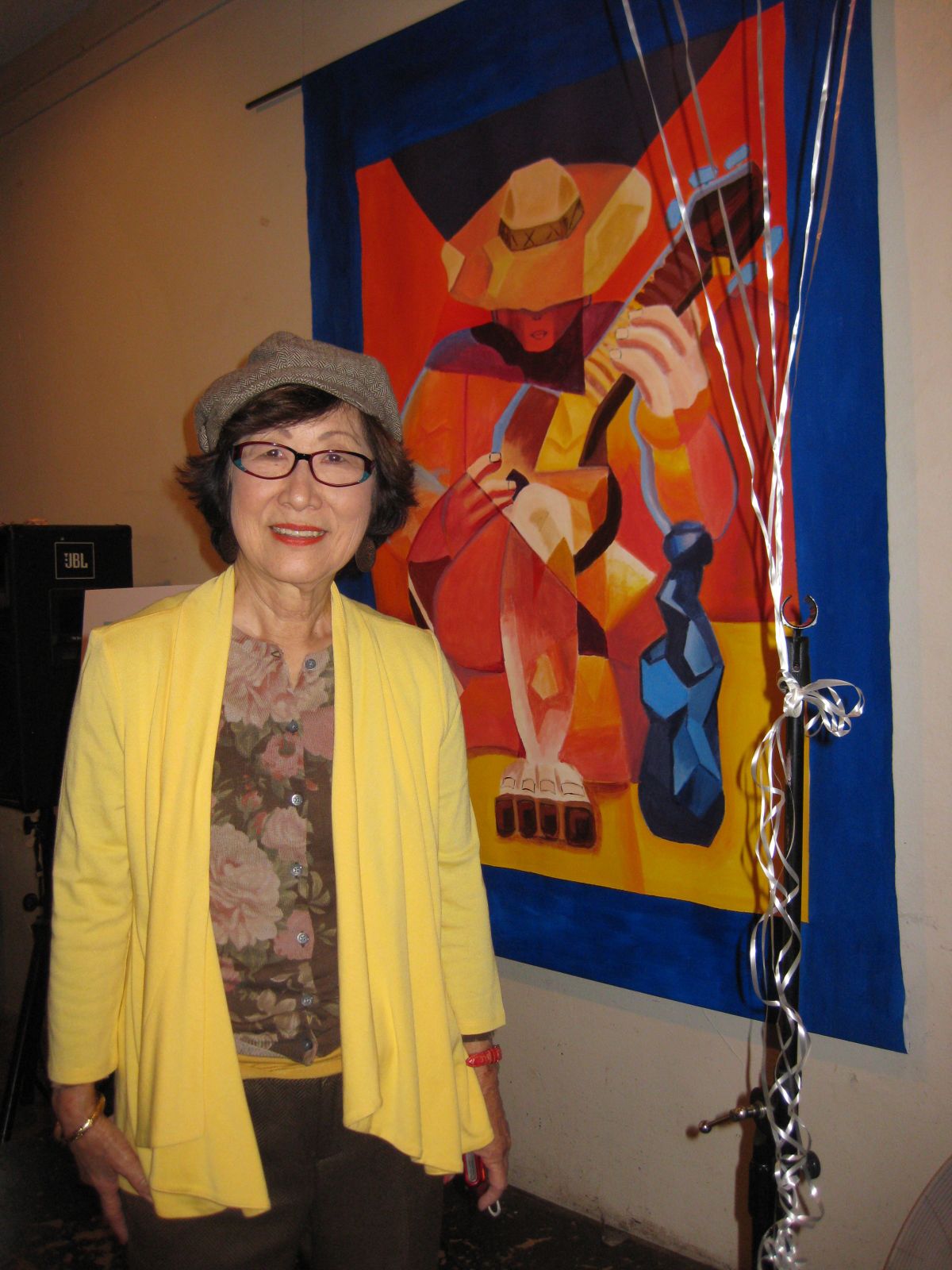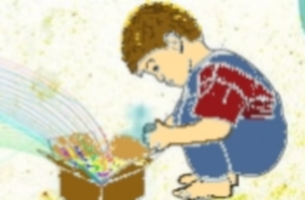omoiyari
The consciousness of omoiyari is the art and practice of putting others first.
It is a world completely preoccupied with a single, unalienated being for whom there is no other
—only a single and universal 'we'.
For decades Sadako's brother, Masahiro Sasaki, has traveled the world giving talks about the central meaning to be culled from the lessons of the bombings of Hiroshima and Nagasaki. He has spoken to peace groups, to diplomats, to the families of 9/11 victims and many others. And for each group or person with whom he speaks, his core message is the same, omoiyari.
"Think about the other person first [omoiyari]. Sadako understood this theme more personally and intensely than most people ever will. And she had only enough time teaching anew what most of us have so easily forgotten."
The mask of self is an illusion The consciousness of omoioyari, when it is fully appreciated, admits no alienating terms such as 'you/me' or 'them/us'. For omoiyari, all relating term are subsets of 'we'. Omoiyari is entirely given to the practice of 'we' and in its world, the world of "putting others first", the other of "you" and the other of "them" are one and the same—a single unalienated being. Only we is possible in the world of omoiyari
"I think 'Omoiyari' is the best way to start. The worst way is to call ourselves victims. To say 'victim' requires a victimizer, and the victimizer is led to blame; and that starts a cycle of blame. For example, if we say 'victim of Hiroshima,' the next sentence that comes up will involve Pearl Harbor and the blaming chain gets stuck all the way in the past. Then we are completely derailed from the lesson that war itself is humanity's Pandora, and that nuclear weapons are something that came out of Pandora's box."
Omoiyari is a single, unalienated being.. The 'we' consciousness of omoiyari is nuanced in a thousand ways, one for each paper crane one might say. "respect", "empathy", "regard", "acceptance", "comity", the golden rule, "connectedness", "commonality", and many other terms are all subsumed at once under its elusive embrace. In a state of omoiyari, "thankfulness" is superfluous, "Sacrifice" is beside the point and "generosity" is always accompanied by its twin "bountiful". Where the givers and recievers are indistinguishable,
what one does in the world for others is what others in the world do for you. No difference, a single being, every act of giving is a mutual act of receiving. So you can't have 'victims' or 'victimizers'.
"It has been more than sixty years since the bombs were dropped. God made everyone equal. So I forget who dropped the bomb. What I am trying to say is that it does not matter who dropped the bomb. Its not an issue. It should never have been an issue for any country. It's an issue for all humanity."
"It is outside the frame of omoiyar to ask if dropping the bomb was a regretable but necessary thing to do, just as much as to ask if it was a barbaric and horrific impulse. The bomber and the bombed are one and the same, in omoiyar terms; all wounds given are also wounds self-inflicted. Omoiyari simply does not permit one to even think outside the 'we-ness' of what is done."
"And she [Sadako] had only enough time teaching anew what most of us have so easily forgotten."
It is arguable whether Americans forgot the lessons of omoiyari, or simply never learned them. Actions of generousity, kindness, empathy and such to happen in the U.S. But the whole of our consciousness, from the beginning, has been about "self", about independence and self-reliance and personal liberty and ownership of things. We pride ourselves on our "exceptionalism", and operate in our "national self-interest". It is hardly any wonder that, though we have many words and acts describing discrete features of omoiyari, we have no term which actually embraces it. It is not (yet) a word in our vocabulary and so, we are as yet unable to even think in its way.
"The important thing is that I, and Sadako, knew the feeling of Omoiyari--and if this principle can be taken to heart and passed down by just a few of you here in this room today, it may, in time, lessen the dangers in the world. You must overcome the sadness and come out of it by passing this simple philosophy down to the next generation. That is my wish. Children!"
[ Excerpts from talks by Masahiro Sasaki's have been taken from Charles Pellegrino's "Last Train From Hiroshima", with the kind permission of the author - ed.]
Glass Half Empty
- better nutrition and tastier more varied diets.
- lower health care costs for everyone in the long run.
- more eyes for more hours on the street means safer neighborhoods.
- better supervision for our neighborhood children.
- sharing surplus helps to foster neighborhood relations and awareness;
- front-yard conversations create good neighbor to neighbor bonds that strengthen our communities.
- net savings in water, carbon and other resources over buying commercially grown products.
- Teaches family members, and passing neighborhood kids lessons in growing food and other
things about gardens. This may seem counter-intuitive to our thinking that kids, especially
urban kids, have no interest in such things. But I can say, from personal experience, that
kids passing by are very curious and ask all kinds of questions. It's a delight to find out
that texting and the mall aren't the only things on their minds.
- Fresh tomatoes near the front gate makes my mailman happy.
- Personal awareness and knowledge of the environment is improved.
- provides good exercise, and very pleasant place to just sit and relax
The list goes on and on, and some of the value of front yard veggie gardening are subtle and hard to describe. I know this to be true, because any year that we don't plant a
row of sunflowers in the front part of our small plot, along the street, the neighbors complain, even ones I don't know and never saw before. Though most of them still mow their lawns, something's going on in those minds that has to do with the presence of our garden. It just takes time.
So Where Are They?
You'd think, with all to be gained, every home in Sacramento would be recycling greywater
and growing incredibly tasty vegies and fruits and herbs, right in plain sight for all to enjoy. But
that hasn't happened. There are good (but surmountable) reasons, of course, "Don't have time," "Too
much work," "No green thumb," and so on. But most of those are just anchors people have
from lack of example, support and evidence of the real value such exercises offer them as well
as the whole state.
Central to the lack of interest is our local press and media. They haven't given the
matter much attention. Certainly not enough to alert our public officials that there's more to
saving resources and the planet than more laws, fines and punishments can ever address. And not
enough to encourage ordinary citizens to look beyond the decades, centuries really, of manufactured
tastes and an arrogance about our place on this earth that can continue to abuse our environment and
get away with it.
I'm not perfect at it—conserving, gardening, recycling and such—no one is. But I certainly know enough now to know that I can't go on wasting things or overlooking simple attentions and think there will always be more of whatever I need tomorrow. What is more serious, though, is what we could do to improve the current much-talk, little-action state of our city when it comes to such matters.
What did happen to the 'Cash-for-Grass' program." Where is the free compost and composting tools the city used to hand out? For not much money at all, the city could provide some free drip system kits (and a volunteer helper to set it up) for anyone who wanted to remove a lawn and plant a garden. I'm sure the Master Gardener program could organize a real, responsive outreach program to help people design their first-time gardens and show them some ways to make it easier and more enjoyable.
It's really not enough to just say something is a good thing to do. It is incumbant on
both our public officials and our press and media to trace the sources that discourage their citizens
from making the changes that are needed. Just discouraging, for example, real estate brokers from
insisting that a well-kept lawn is a "plus" to both buyers and sellers, would go a long way
towards turning around the centuries-old aesthetic that insisted that such barren, if green, open
space were some kind of proof that we were "better than nature". We're not. So why to we continue to
promote an aesthetic that continues to insist that we are?
The Z did visit the City of Sacramento conservation pages. And we couldn't find a single word about greywater nor front yard/veggie gardens, nor a dozen other things that people can and would be doing with a little help and imagination and encouragement from our city officials and our press. So we can only wonder what's holding up the show? Why is are press so behind the times? If we don't want to be cowtown, then we really need to stop acting like one. That hasn't happened yet.
Yes, its not as sexy on our front pages as some big sports photo, or a politician hiring his brother-in-law, or what some actress got caught doing with somebody else in some place you never heard of. True, there is other important stuff on our daily front pages—great crises (about which we can do little) and major human interest matters that are always good to pass around.
So that's what the Z is here for. To bring a little attention to things which will
become more and more essential for 21st century citizenship. We don't have to get everything perfect.
But "none" is not good enough. If our leaders and sources of information expect more from us, then
they must offer more to us in retun than some feel-good speeches and a whole lot of silence. And
that's why we're here.
"Free and Clear
"FREE AND CLEAR"
"free and clear." Those were the last earth-bound words from Summer-
aka Summer Breeze, aka Edy Benjamin, aka Motherbird, Jalapeno Pepper, Moongate de Sentiens, Publisher, poet, editrix, Champion-of-the-Oppressed, Map-For-Lost-Poets, Rx for the wounded, soup-kitchen for the down-and out, mender-of-broken-wings and steward of Summer's Hill, friend, and just plain old good soul-
after she flew away on May 20th, 2014. As Summer might have put it, "Those aka's, they're 'All Knowledgeable Associates' of mine, and I'm taking them with me."
Summer was all of her AKAs and more, always there no matter what the need or occasion. Now, she's "free & clear", but not quite. she left two of her aka's behind, just so we wouldn't forget -an oxygen bottle for our minds and a blue Bombay gin bottle for our hearts.
We celebrate a life that will never quite leave us. An endless summer that began with the solstice of 2014 and goes on and on and on, the way Summers have always done. We, her close friends will continue to reflect and collect her works and our, poems, art, music, recollections, emails, and musings on Summer. As Summer might say, "You have my permission."
i think you were the one who picked me up
when my slave back broke down
gave me wings and sent me flying
and i was crying 'i don't want to leave you'
you smiled again with loveliness and promised
'our roads will meet again'
Summer Breeze to Frances Kakugawa, June, 2011
Featured this month in the Zee Arts! Section
"Permission"
by Summer Breeze
WHYZ?
despite all evidence to the contrary, we still imagine that their is another dimension to all of this...to solving all of the problems we've never been able to solve, to remedy all of the unimaginably destructive behaviors we exhibit as if the grail we seek could only be found by destroying everything and anyone around us, often in the most horrific ways imaginable, just for the sake of starting over.
But at the end of the x,y journey of the human project, we seem to be as clueless about how to escape the mind-forged manacles we wear, as if those shackels were the very substance of who and what we are and to take them off would be the equivalent of ceasing to exist. So we pretend, and we pretend to pretend and we go on pretending.
And that we do is the most convincing argument that we may not, after all, be entirely composed of x,y-stuff, but of something else as well, some part of ourselves that can actually live outside the box of its own pretense—that there is another dimension to this project that is not simply toward or away from moments of the historical back&forth we've made it out to be.
The fact that we can pretend not to be x,y-bound creatures is the most hopeful indicator that we may yet find our way onto that other axis, the one which is precisely 90-degrees from everything we propose to know about ourselves; the one we give every indication that it is not even remotely available to organisms such as ourselves.
A z-axis thinker (and we're still a long way from seeing one of those) might
say that pretense alone is sufficient proof of actuality. One simply does not pretend what
is not. Can't be done. And so z-axis folks seem to take some satisfaction in pretending
to be z-axis folks. Mind you, we're not speaking about variations on the themes of contrariness.
There are those 180-degree pretenders who would insist that
what you are, you are not. The furthest a real z-actor might go is to say that what you are
won't get you there. But they'd never venture to say you are not what you are for that reason.
In z-parlance, one of the most outstanding moments of z-axis clarity in the 20th century came from the lips of an obscure White House staffer who first said, "Reality is what we say it is." (though it was quickly re-attributed to have come from the mouth of someone else - Dick Cheney, Karl Rove or a host of other truly sinister characters.) True, it came fully dressed in Machiavellian garb. And true, it's not the first time in history that observation has been made. But it came at a moment of time that fully implied all the depravity and splendor such realization could possibly embrace.
Once out of the x,y-box, as Z-eekers might say, it could not be contained and controlled by its original owners. Once said, reality itself becomes a said affair. There is no way to keep that to onself. Everyone and anyone can just as easily say reality as that first bunch of "official sayers", who really counted on having their say of it all to themselves. Occupy is also a direct descendent of the saying of reality. That it didn't succeed subtracts nothing from that fact, save that the saying of reality has limited scope and a fairly short half-life if it doesn't also posess the power to sustain itself.
Still, the cat-walk was out of the bag, and no one could put it back again. The world is made of magic, and the magic is made of words. If you know the words, then you know the magic that creates the world.*
So what has that got to do with the Z-newspaper? For one, I don't think the z-nooze is about the saying of it - real or otherwise. It seems to me we're more about having a look at the current crop of sayers and trying to figure out what it is they're saying and how it is they seem to get away with saying it. The press, of course would deny they are saying reality at all. They take the very narrow view that they are merely letting us know what other sayers of reality are saying it is—that they are just a neutral conduit for what has transpired out of the mouths and pockets of others.
Nice try, press. Our take on the matter is that our media is dead center in the massaging of the reality we get. They package it, amplify it, add their own agenda into the mix and pretty much insure that it works the way they say it works and is because they say it is.
So, it seemed to us a good place to start would be to examine what our local press is doing, and how they operate the levers of reality. We won't be saying reality exactly, but we will be trying to pass along enough of the incantions and other hokus-pokus of the media's versions of reality that our reader's might find useful in their own saying of reality.
From our perspective, the media and press has kept a pretty tight grip on saying what reality is and what it ought to be. It's a pretty safe bet the Z won't be doing much of that, much saying of its own. At this time (and z-kinds pretty much agree that the 21st century is still a long way off), the most zeeks can do is pretend there is a z-axis reality. We'll do a bit of that too, for entertainment purpose if for no other reason. But the only reality The Z Newspaper needs to hand down is the one that says no one, no special group of powerful individuals, no grand schemers for either the destruction or salvation of the human project (and often you can't tell one from the other) own the saying of reality. If they try, we'll be here watching and re-saying it so everyone can know the words and get into the act. We certainly hope you do.
- Red slider, editor & steward
The Z Newspaper
[* a paraphrase from Terence McKenna ("Alien Dreamtime" a multimedia event recorded live. 27 February 1993). The original incantation was "The real secret of magic is that the world is made of words, and that if you know the words that the world is made of you can make of it whatever you wish." - ed.]
October 6,2014 (Sac Z, page 2, 'Glass Half Empty')
CORRECTION/RETRACTION!
The Sacramento Bee has actually just carried a frontpage, 4-column spread,
with big photo and headline ("New house goes easy on water...", SacBee, Sunday Oct 5th), promoting
graywater as the wave of the future. We apologize if we made it appear the Bee never does greywater
articles...
well, not exactly. It wasn't really about greywater. It was a promotion gimick for
a developer's "house of the future", featuring a very expensive, very complex greywater recycling
system, used in their "demonstration home" in the El Dorado Hills as a marketing ploy for their
newly planned development there.
And it's not really "frontpage". It's on the front page of the 'Business Section'. And
it doesn't really encourage average homeowners to run out and install a greywater system. Quite the
opposite. The article describes the feature as "relatively expensive", "futuristic", "likely [to]
come down in price...in coming years." and so on. The system appears to be in the 8 to
15-thousand dollar range and, the developers say, "retrofitting an existing house would be far more
expensive". Of course it will. These guys build new homes, they're not in the business of retrofitting
old ones. Um duh, not something to get us fired up to go out and put a little shower water on our
azelias, now is it?
It positively discourages
ordinary people from thinking about simple home greywater systems which, for a hundred dollars or less,
you can be delighting both your thirsty veggies and the water police.
Indeed, this glimpse of the "future" is itself an obsolete concept of resource
wasting, last-century, suburban-sprawl palatial boxes for people to live in. The future, in the
view of those who will have to inhabit it, if/when the 21st century arrives, may look on such
wasteful indulgences as just one more example of how those before them put market-values ahead of
real-values and left their heirs to clean up the mess. I expect the opening page of their indictment will use the developer vice-president's own words, "Dollars are what's important to the customer." (Exhibit #1). If "dollars are what's important," then get yourself a little plastic pipe, some fittings and a couple of $20 diverter valves and you're in business.
So what is the wonderful Earth-sustaining application to which the developers so diligently wish to put their eco-consiousness to preserving? Why, as the Bee article points out, "to irrigate lawns" (exhibit #2). [We haven't even sifted in the added costs of materials used to build these elegant systems, and what that will add to our overburdened carbon footprint on this planet - ed.]
Nice try Bee. Not exactly what we had in mind when we enouraged the press to give more attention to the potentials of greywater recycling. Well, we will just have to call this story a correction/retraction of a "CORRECTION/RETRACTION." But hey, look at it this way. Next time I search your archives on the keyword "graywater", two articles will pop up instead of one. Of course it will be grey'd out by your troll-gate demanding payment to read it. But then we can't be freeloaders, can we?
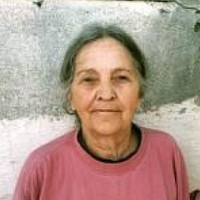
Summer Breeze
1934-2014
If I chose to write an obituary for Summer Breeze, It might have been something like the one below. But I'm not going to celebrate her death. Instead, I choose to celebrate the fact that she is still with us, doing what she always did, celebrating us.:
Summer Breeze died on May 20th, 2014 at the age of 80. she wasn't a Maya Angelou, never had her 15 minutes of fame, or multitudes of adoring fans. But, as Maya might have put it, she was no less important or influential for that. It was not for her to seek the approval of others and curry their favor, as it was for her to seek out others whom she could care for and
offer genuine support.
Summer was a poet of notable gift, and a champion and fighter for the rights of prisoners, the homeless,the abandoned and hopeless, or anyone who suffered injustice or just plain bad-luck from the vagaries of life. Over the years at her home in the hills of Silver City, New Mexico, she took in poets and artists and wanderers of every imaginable kind and fed them and sheltered them and encouraged them to keep on, no matter what their misfortune. She was Summer Breeze to friends and family, and Motherbird to many, many more.
She was the publisher of Motherbird books and gave print to many gifted poets who would have otherwise gone printless and unnoticed. Her drink of choice was Bombay gin, tying the empty blue bottles to a tree in her yard --- proving the Tree of Life and the Tree of Knowledge weren't the only offerings from the Garden of Eden. Even if you didn't know her, you should miss
her. She was just that good a soul, and we're all the poorer for her absence. In short, she was
one of our own.
No, no obits for Summer Breeze. She was one of those rare individuals who
never needed to learn omoiyari. It came to her naturally, and she practiced it
for most of her life. Instead,
The Sacramento Z Newspaper dedicates this issue of the 'Z' to the memory of Summer Breeze,
a dear friend and colleague who made a habit out of putting others first and left the world a better place than when she first arrived. A Summer Breeze that will ripple out among us for many summers to come.
You can learn more about Summer and the things she loved on her website:
"Moongate Internationale" and reading
A summer
solstice tribute to Summer from her friends. Her chapbook, "Stretching of the Heart", is also available free, online
Be Happy Don't Worry
of course hell is on earth and no where else
see all the fires of hate burning brightly
is was
a spring of hope and seeding
it was
a summer of promise and hoeing
almost autumn
but not quite
these seven last days of summer
quite outrageous in human time
bottled-up anger is bound to burst
what doesn't kill makes us strong
what is out of our control
is out of our control
there is also a time
to be the observer
the chronicler
the counter of tears
falling
falling
till
the last tear drop falls
- Summer Breeze, September 13, 2012
First published by Artvilla, September 13, 2012.

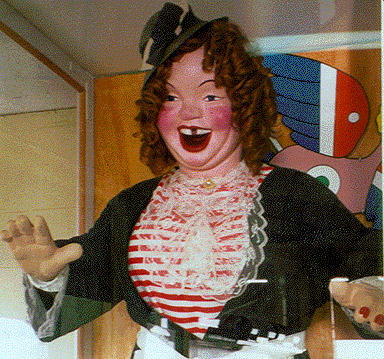 Laughing Lady
Laughing Lady
